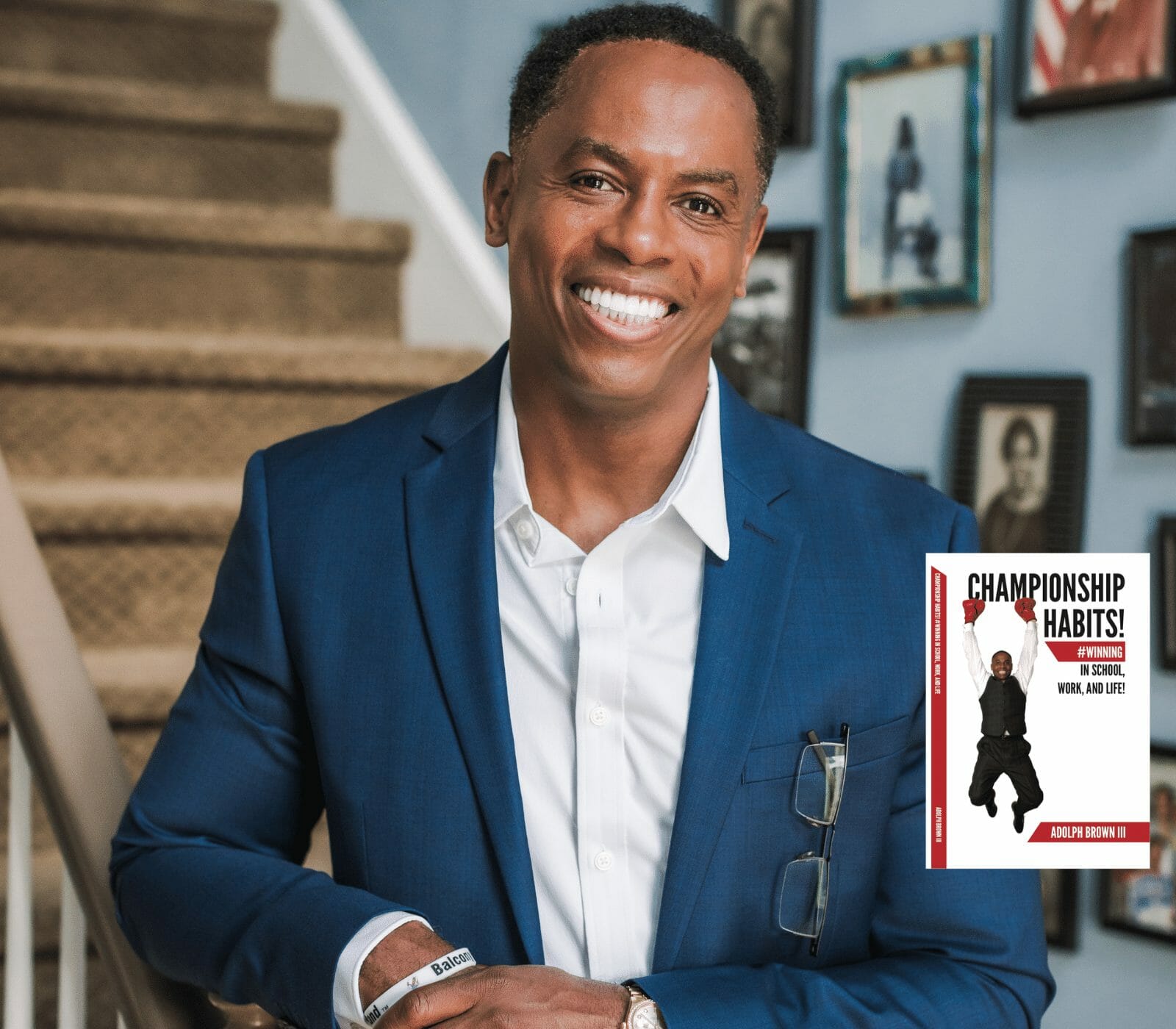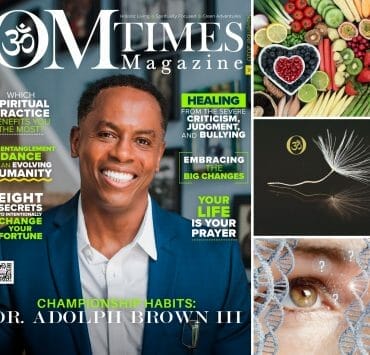Dr. Adolph Brown III: The Championship Habits

Dr. Adolph Brown is a life-long social justice advocate, American businessman, author, urban and rural school educator, research-scientist, and keynote speaker. A Master Teacher, Dr. Brown is in the top 1% of world-class scholar-teachers. He travels worldwide to conduct seminars on Unconscious Bias, Equity, Diversity, and Inclusion. His latest work is Championship Habits.
An Interview with Dr. Adolph Brown III – Championship Habits
Interview by Liane Buck
Dr. Adolph Brown is a life-long social justice advocate and a career teacher educator. He is best known for inspiring individuals to learn, laugh and lead, while as an implicit bias speaker, simultaneously reducing unconscious bias at every turn. He is the leading provider of anti-bias training in business and education. He is highly regarded as the “balcony” leadership speaker and highly skilled performance coach who gets you from where you are to where you want to be.
Dr. Brown earned his undergraduate degrees in anthropology and psychology with a minor in education, a master’s degree in special education and experimental psychology, and a doctorate degree in clinical psychology. He is the author of acclaimed books, including the international mental wellness bestseller, Two Backpacks. Dr. Brown authored other bestsellers include a soft business skills classic – Championship Habits; and the education classic – Real Talk.
As a much sought-after Master Teacher, Dr. Brown is in the top 1% of world-class scholar-teachers. He travels worldwide to conduct seminars on Unconscious Bias, Equity, Diversity, and Inclusion keynote speaker. Dr. Brown skillfully addresses the impact of stereotypes. He credits much of his success to the luxury of humble beginnings of being reared by a single parent mother in abject poverty of the inner-city housing projects infested with gangs, drugs, and violence.
OMTimes: Dr. Brown, you have said that we have seen an increase in young people who have stepped up to change their future, with the Black Lives Matter movement, for instance. Yet, many of our youth feel as though their vote does not count, which contributes to their hesitation to not vote at all. Why is that? Why do you believe millennials are less likely to vote than other generations? What is so complicated and different about the Millennials?
Dr. Adolph Brown: Millennials represent those born in the early 1980s through the 1990s. By nature, millennials are very transient. The lack of permanent residence makes it difficult to continue updating their voter registration. Besides, millennials are delaying marriage, children, and home-buying as they are focused on building their careers. This also further delays their political involvement and engagement. Lastly, millennials are simply disillusioned. Many times, millennials don’t believe that their vote will carry weight because the “system” will still be in place.
OMTimes: How would you describe, anthropologically speaking, this new civil movement process, the social movement revival with Black Lives Matter, and what has changed since the time of Malcolm X?
Dr. Adolph Brown: Black people have been dying at the police’s hands since America’s inception. There isn’t anything new about that. However, it is new to see all types of Americans – Whites, Asians, clergymen, and small businesses, acknowledging Black Americans’ pain and plight. It’s not enough for Americans to speak out in solidarity; it is now expected that ALL Americans take actionable strides in the movement to end anti-Black racism and uphold racial diversity and inclusion in their community.
OMTimes: Considering our country’s actual state of affairs, the convoluted social/civil unrest compounded by the surprising social isolation elements, and the global pandemic, how do you foresee the USA Post Election scenario, independently of the winner?
Dr. Adolph Brown: Typically, when we deal with trauma, it is within our circle of friends and family. This year, our entire country has experienced a great deal of turbulence that has affected all parts of our lives – home environments, political landscape, and even our workplaces. For example, we witnessed working parents balancing the demands of their job with childcare. Also, Blacks saw a modern-day lynching with the death of George Floyd. These events have demanded a culture of kindness and compassion. I do see the practice of empathy and understanding evolving over time.
OMTimes: America’s demographics are changing dramatically! In your opinion, what steps do we need to take as a collective to transform and heal our divided society? How do we reinvent ourselves as an inclusive, compassionate, and diverse culture post-pandemic?
Dr. Adolph Brown: I think the first step is rebuilding human compassion. When we understand each other’s experiences, we can build a relational bond and make steps towards healing. I think it’s safe to say that everyone experienced something unpleasant this year. Whether it was a missed vacation or the death of a loved one, we can all share in the grief. We need to use those upsetting experiences to draw us together and not apart. I also think there are several lessons regarding social, political, and health issues that we can take forward with us.
OMTimes: As a Clinical Psychologist, how do you see the current state of mind of our society and the Nation’s mental health? How is the stress level pairing with a difficult political scenario and the social distancing effect of the pandemic?’
Dr. Adolph Brown: On one hand, I think the pandemic slowed life down (for the positive)! Most American families are overscheduled and overstressed. For these families, the pandemic allowed them a moment to stop, breathe, and reconnect. I know for myself; it was an opportunity to catch up on my never-ending home to-do list. On the other hand, the pandemic eliminated life distractions like bars, parties, and movies, so people were forced to sit with themselves and ruminate in their thoughts. For people who don’t like what they see in the mirror, the pandemic possibly did more harm than good to their mental health. Besides, the pandemic imposed social distance between friends and families. This isolation definitely leads to depressive and anxious thoughts.
OMTimes: Loneliness is an endemic problem of our Contemporary Society. Every year, during the Holidays, we witness a rise in the number of people with depression and a significant increase in suicide. What can we do as individuals to help mitigate these effects, especially in such a difficult time during this global pandemic? How can we help others to cope with the side effects of grief and social isolation?
Dr. Adolph Brown: We may be geographically separated, but we can still connect virtually. My family and I have a group chat that even includes my sons-in-law. While most of the family group chat content is videos and pictures of my grandson, it is a way for my family to communicate. Who says that you can’t have a Thanksgiving dinner over zoom? I also think that people need to be intentional about reaching out to others during this pandemic season. I recommend that you reach out to someone that you haven’t spoken to in a while. Also, I think that practicing gratitude is an excellent strategy! With many challenges thrown at us this year, no one is at his or her best. We all deserve some grace!
OMTimes: How do you explain our Nation’s transition to the “new face worldwide” (and the mindset behind it), going from the beacon of freedom and hope to adopt a dystopian authoritarian figure as a leader? In your opinion, how did we allow the re-editing, extending, and reviving of America’s original sin, which is playing the race card, including Americans versus Americans?
Dr. Adolph Brown: I’m unsure if this “new face” is 100 percent accepted and respected worldwide. The sin of racism has never gone away. Social media and recording devices have made once covert incidences more readily available for public viewing, scrutiny, and protest. To acknowledge the country’s history of racism, we must also acknowledge the inherent privileges of those imposing racist ideology and practices. This has a tendency to pit Americans against Americans as the eradication of racism also means the loss of an ideology of superiority and structures put in place to maintain them. The phrase “playing the race card” or speaking about racism and those subjected to its implications is used to detract from, devalue and minimize legitimate claims of racism. The rhetorical device essentially attempts to blame and shame the victim. In my research and work, I objectively explain racism as a significant social problem of our day that must be honestly evaluated and eradicated.
OMTimes: We’ve all heard the saying “the children are our future” this is unquestionably true. Yet, the numbers of children who are experiencing anxiety, depression, and more have skyrocketed more than ever before. Why do you believe this is? How can parents and teachers ensure that our next generation of leaders get the proper mental health care they deserve?
Dr. Adolph Brown: I have a two-word answer: social media! We are constantly posting, scrolling, comparing, competing, and repeating. Social media is the highlight reel. Although we know that this, it still negatively impacts our self-esteem and self-image. For children and future leaders of our country, I think it’s important to understand social media’s proper use. Social media is a wonderful way to connect and share our lives with family and friends. However, there should be limits to what we are exposed to, and we should also consider what type of news we absorb on our feeds.
Continue to Page 2 of the Interview with Dr. Adolph Brown
Creatrix from Sirius. Fairly Odd Mother of Saints (Bernards). Fish Tank aficionado by day ninja by night. Liane is also the Editor-in-Chief of OMTimes Magazine, Co-Founder of Humanity Healing International and Humanity Healing Network, and a Board Member of Saint Lazarus Relief Fund.




